 Late Ottoman Origins of Modern Islamic Thought
Late Ottoman Origins of Modern Islamic Thought Book contents
- Late Ottoman Origins of Modern Islamic Thought
- Cambridge Studies in Islamic Civilization
- Late Ottoman Origins of Modern Islamic Thought
- Copyright page
- Contents
- Figures
- Preface
- Note on Style
- 1 The Late Ottoman Intellectual Tradition
- 2 Ottoman Exiles
- 3 The Ottoman Scholars and Their Reception of Muḥammad ʿAbduh
- 4 The Salafi Revolution
- 5 Nation-State, Islamic State
- 6 The Late Ottomans’ Impact on Modern Islamic Thought
- Appendices
- Bibliography
- Index
- Other titles in the series
3 - The Ottoman Scholars and Their Reception of Muḥammad ʿAbduh
Published online by Cambridge University Press: 03 November 2022
- Late Ottoman Origins of Modern Islamic Thought
- Cambridge Studies in Islamic Civilization
- Late Ottoman Origins of Modern Islamic Thought
- Copyright page
- Contents
- Figures
- Preface
- Note on Style
- 1 The Late Ottoman Intellectual Tradition
- 2 Ottoman Exiles
- 3 The Ottoman Scholars and Their Reception of Muḥammad ʿAbduh
- 4 The Salafi Revolution
- 5 Nation-State, Islamic State
- 6 The Late Ottomans’ Impact on Modern Islamic Thought
- Appendices
- Bibliography
- Index
- Other titles in the series
Summary
This chapter looks in detail at the Turkish exiles’ engagement with the modernist trend in Egypt and the ideas of Muḥammad ʿAbduh. It reviews the Islāmiyyāt literature of Egyptian intellectuals in the 1930s and 1940s, Sabri’s response to this trend, his belief that Egypt had voluntarily adopted the radical ideas that Atatürk had forced on the Turkey he fled, and his conviction that ʿAbduh’s reformism was responsible for this. It then looks at Mehmed Akif’s work in Istanbul and Cairo in centring Late Ottoman Islamism around the ideas of ʿAbduh and considers comparisons between Akif and Indian thinker Muḥammad Iqbāl, whom Akif helped introduce to Arab audiences.
Keywords
- Type
- Chapter
- Information
- Late Ottoman Origins of Modern Islamic ThoughtTurkish and Egyptian Thinkers on the Disruption of Islamic Knowledge, pp. 77 - 130Publisher: Cambridge University PressPrint publication year: 2022
